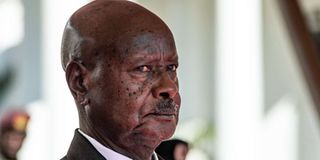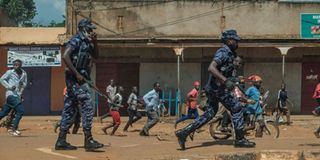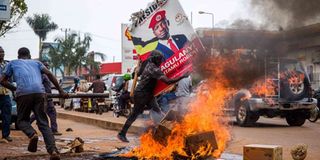
Bibi Wine.
| Sumy Sadurni | AFPNews
Premium
Uganda's Yoweri Museveni unmoved as Bobi Wine poll tanks roll in
Ugandan President Yoweri Museveni is the latest strongman to face growing opposition to his rule, as restlessness continues to sweep authoritarian regimes from power across the continent.
Mr Museveni is battling protests led by pop star-turned-politician Robert Kyagulanyi, alias Bobi Wine, ahead of the country’s January election, in what is shaping up to be the greatest test yet to the Ugandan president’s three decades in power.
Mr Museveni, who came to power after toppling the regimes of Idi Amin and Milton Obote through guerrilla warfare, has ruled the East African country since the late 1980s, championing peace and prosperity.
His regime has, however, been dogged by accusations of suppression of freedom and dictatorship in the past couple of years.

Ugandan President Yoweri Museveni. He has been in power since 1986.
Star power
Wine, a popular figure among the country’s vastly young population, is banking on his star power to change the country’s fortunes in the face of what he characterises as autocratic leadership and Mr Museveni’s firm grip on power.
The popular artiste likens Mr Museveni to present and past autocrats in Africa, including former Sudanese president Omar al-Bashir, Gambia’s Yahya Jammeh, Hosni Mubarak of Egypt and the late Robert Mugabe of Zimbabwe, all of whom, in their prime, ruled their countries with an iron fist before they were toppled by rebellion from within.
“What we are experiencing in Uganda is a cycle of what we keep thinking of as generational change. Unfortunately for Uganda, this has never happened and does not seem to be happening, for some reason,” Prof Winnie Mitullah, a lecturer at the University of Nairobi and political analyst, said.
Mr Bashir was dethroned by the military following months of unrest in 2019. The civilian uprising began in late 2018 as demonstrations against austerity measures morphed into a call to end Bashir's rule.
The former Sudanese leader is also facing war-crimes and genocide charges at the International Criminal Court (ICC) in The Hague, while his former Gambian counterpart, Mr Jammeh, is currently in exile in Equatorial Guinea after he refused to concede defeat following elections in December 2016.
Mr Bashir is accused of committing serious crimes in a conflict that broke out in Darfur in 2003 and which led to the deaths of 300,000 people.
Mr Museveni was in the mid to late 1990s celebrated by the West and most of his admirers as part of the new generation of African leaders under whose leadership Uganda experienced significant success in the fight against HIV/Aids and relative peace.

Bobi Wine waves at supporters as he makes his way to be officially nominated as a presidential candidate in the upcoming Uganda elections.
Public resentment
This admiration, however, wore off over time, turning into public resentment for the former army general.
Mr Museveni would later be accused by his critics of clamping down on the opposition and manipulating the constitution to extend his leadership.
“We are supposed to be celebrating independence but Ugandans have nothing to celebrate. President Museveni is very scared of the ideas that we represent. He believes by blocking us from communication, by stopping us from enjoying our rights, he is going to disempower us, he is going to demotivate us,” Wine said.
The script in Uganda, though not a new phenomenon for a country that has tried countless times to topple the leadership of the 76-year-old Mr Museveni, borrows much from others like the Arab Spring, which many analysts tied to growing fatigue by the younger generation with a leadership they believe serves none of their interests.
The Arab Spring, which started in Tunisia in 2010, was fuelled by what protesters termed as mistreatment of citizens by the government, as well as corruption in the police force. The protests were touched off by the self-immolation of Mohamed Bouazizi, a street vendor who set himself on fire.
The protests would later spread to neighbouring countries like Egypt, where former president Hosni Mubarak, the country’s autocrat, was toppled and later imprisoned. Mr Mubarak died in prison aged 91.

Uganda police disperse crowds in Kayunga town on December 1, 2020 as they gather to welcome Bobi Wine.
Shift
“There is certainly a shift where the younger generation is slowly taking over. But unlike the Arab Spring where we witnessed young people moving to the streets to protest against bad leadership, most of the Sub-Saharan Africa and even the East Africa region lacks that kind of ideology. The protests have become more of rent-seeking avenues,” Prof Mitullah said.
President Museveni faces the uphill task of uniting the country amid growing agitation for change dating back to 2000, but he seems all too careful not to follow the same path as his previous compatriots.
“The Ugandan scenario is actually not a changing dynamic as much. If you look closely, you will realise that the opposition wave started sometime in 2000 in the urban areas, then in 2006, 2011, 2016 and even now,” said Mr Francis Kibirige, an analyst and researcher on Ugandan politics.
Mr Kibirige, an official with Afrobarometer – a Pan-African research institution – said while the writing has been on the wall for Mr Museveni for some time now, toppling him may be an uphill task due to a number of factors — his popularity among the rural folk, power of incumbency and a fragmented opposition that despite promising change, has been unable to marshal universal support across the country.
“It is still not clear what the results of this election will be. But what is certain is that no one can win only on the youth vote, the gender vote and all. You only win on the regional vote, meaning that one must pick votes from every place in the country,” he said.

Supporters of Bobi Wine face off with police in Kampala on November 18, 2020.
Tilt the margins
Mr Kibirige said the only hope for Wine is to try and tilt the margins away from Mr Museveni as much as possible, by rallying as many people as possible to vote in the January polls.
“The other challenge is that in Uganda, there is also a considerable number of people who do not have identity cards, which is the essential tool in voting. The voting/polling station locators are also not accessible to some, and so you may end up with people turning up at the wrong stations and being turned away to go find their voting stations, which may be a long distance away,” he added.
To Wine, Mr Museveni’s leadership of has been nothing but a disappointment, not only to the older generation of Ugandans, but also to the younger ones, many of whom have grown up seeing him in power.
“Dictators are not massaged out of power. Dictators are resisted and we are not going to stop at anything. We are going to resist the Museveni dictatorship,” Wine said.





